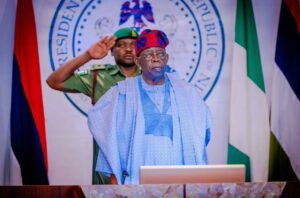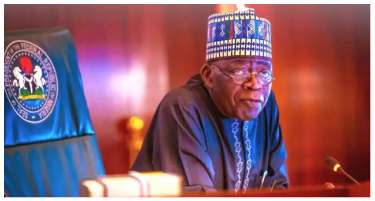President Bola Tinubu has recently defended the decision to reintroduce Nigeria’s old national anthem, “Nigeria, We Hail Thee,” stating that it is a priority for his administration. This move, which has sparked considerable debate across various sectors, was solidified when Tinubu signed a bill reinstating the anthem. During a meeting with the Arewa Consultative Forum (ACF) at the Presidential Villa in Abuja, Tinubu addressed the criticisms, affirming the significance of the reintroduction.
In his remarks, President Tinubu acknowledged the controversy surrounding the change but stood firm in his conviction. “Let me allude to something that happened yesterday. The change of the national anthem, ‘Nigeria, We Hail Thee,'” he began. “Some people say, okay… say what? Is that your priority? It’s my priority. I agree with the National Assembly. If they make law, I’ve got to obey that law, or we disagree openly and close the chapter.”
He emphasized the importance of adhering to legislative decisions and respecting the processes that lead to such changes. Tinubu’s stance is that the reintroduction of the old anthem is not merely a symbolic gesture but a step toward reinforcing national identity and unity.
 During the meeting, Tinubu also stressed the importance of national unity, underscoring Nigeria’s diversity as a source of strength. “But the question of diversity. Who gave us the name Nigeria? Is it not Britain? Or somewhere? Have we changed our name? We are Nigerians. Our passport shows that,” he told the gathering. “As long as we are Nigerians and one family, we remain and protect our diversity and love one another as brothers and sisters.”
During the meeting, Tinubu also stressed the importance of national unity, underscoring Nigeria’s diversity as a source of strength. “But the question of diversity. Who gave us the name Nigeria? Is it not Britain? Or somewhere? Have we changed our name? We are Nigerians. Our passport shows that,” he told the gathering. “As long as we are Nigerians and one family, we remain and protect our diversity and love one another as brothers and sisters.”
Tinubu pointed out that the diversity of Nigeria, bestowed upon its people by divine providence, should be embraced and celebrated. “It is God Almighty that puts you in that particular place and makes you a member of that family. You have no control over it,” he said. His message was clear: national unity and cohesion are paramount, and symbols such as the national anthem play a crucial role in fostering this unity.
Reflecting on his political journey, Tinubu highlighted that his campaign was not based on ethnic or regional identity, but on his individual merits and vision for the country. “When I came begging for votes, I didn’t say vote for me as a Yoruba man, I said vote for me as Bola Ahmed Tinubu,” he reminded the attendees.
The reintroduction of “Nigeria, We Hail Thee” is seen by Tinubu and his supporters as a move that honors the country’s history and roots. The old anthem, which predates the current one, “Arise, O Compatriots,” evokes a sense of nostalgia and is believed to foster a deeper connection to Nigeria’s post-independence aspirations.
Critics, however, argue that the reintroduction of the old anthem is a misplaced priority amidst numerous pressing issues facing the nation, such as economic challenges, security concerns, and social inequalities. They believe that the government’s focus should be on addressing these immediate problems rather than changing national symbols.
Despite the criticisms, Tinubu’s administration is committed to this change, viewing it as a step towards national reawakening. The President’s dialogue with the ACF highlighted his broader vision of unity and the importance of embracing Nigeria’s diverse cultural landscape. For Tinubu, the anthem represents more than just a song; it is a call to remember and uphold the values that bind Nigerians together as one nation.
As the debate continues, it remains to be seen how this change will be received in the long term and whether it will achieve the intended impact of fostering national unity and pride. President Tinubu’s assertion that the anthem’s reinstatement is a priority underscores his dedication to promoting a unified national identity, even as the nation grapples with various socio-economic challenges.




